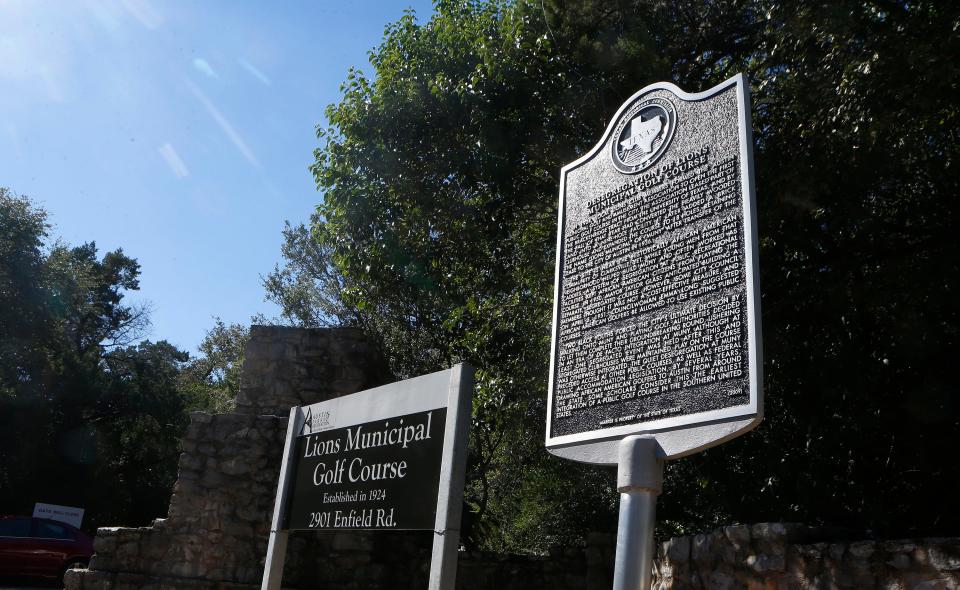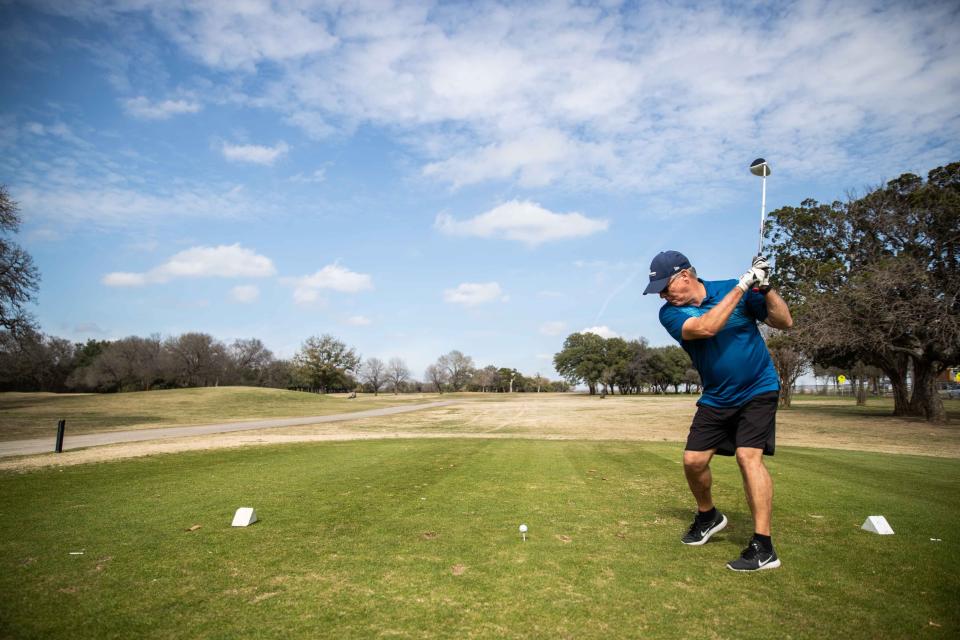Hey Texas, can you spare a golf course? Austin's Lions Municipal depends on answer | Bohls
For years now, we’ve heard the pleas, and the voices are getting louder. But so is the silence on the other end.
Save Muny.
Preserve one of the oldest public golf courses in Texas, its staunch supporters say.
But this is about so much more than golf and keeping a venerable course built in 1924, the same year Royal-Memorial Stadium went up on the University of Texas campus. It’s about social history, about civil rights as the first desegregated public course in the South, about opportunities for young and old, about high school golfers and senior golfers, about teaching the game, about a university’s umbilical cord with a city that supports it, about urban green space, about doing the right thing.
And, yes, it’s about money.
Alas, the rallying cry might be falling on deaf ears.
Lions Municipal Golf Course is every bit as much in danger today as when the city’s lease for the historic property on the north bank of Lady Bird Lake expired in May 2019. Ever since, under an agreement between landlord UT and the city of Austin, Muny has operated on a five-month rolling lease.
Basically a handshake agreement.
Bohls: No one would make a better college football commissioner than Nick Saban, trust me
And the more quiet the university gets, the more worried Muny friends get and the more at risk the future of the course becomes. The site is already listed by the National Trust for Historic Preservation as one of the 11 most endangered historic sites in America.
“The university has an opportunity to embrace this and understand what a great jewel it is and heal a part of the tortured past it has with the issue of race,” said Gary Bledsoe, the president of the Texas NAACP. “It’s a really big deal. This is an opportunity for the university not to continue its history of hostility toward African Americans. I don’t know if I’m disillusioned, but I have a great deal of concern and alarm.”

Looking for a cause? Follow the money
The problem is money, as it always is.
Muny sits on the 345-acre Brackenridge tract, and the 141 acres for the golf course could command a price tag "in excess of $750 million,” one prominent local real estate developer told the American-Statesman last week.
And the figure could grow even higher with density allowances and possible height variances that other large tracts in Austin have received. The developer said he could see the land being used for “high density housing” but also including commercial offices and upscale retail stores. Such a deal would probably require keeping up to 40% of the land devoted to green space.
Golden: Former Texas receiver Kyle Shanahan holds Longhorns football close to his heart
The Muny Conservancy is hoping at a minimum that the 18-hole golf course amid the thick canopy of oak, elm and ash trees tucked away in that West Austin neighborhood could survive as that mandated green space, even if UT wants to develop the rest of the land.
“The land where the golf course currently sits was donated to the university to benefit our students,” Kevin Eltife, chairman of the UT System Board of Regents, told the Statesman in a statement Wednesday. “The Board of Regents and the university leadership take their responsibility to steward this gift and all gifts seriously. We will continue to work with the flagship to understand all options that accomplish the best long-term use of the asset, making sure our students for generations to come benefit along with the Austin community.”
More: The American-Statesman's book on Texas' Big 12 era is 160 pages of hardcover history
Are you listening, Texas?
The best option is to keep Muny as it is. Simple as that.
So is the university actively seeking a buyer for this attractive property just minutes from downtown?
“We don’t know what's going on behind closed doors,” said Scotty Sayers, Ben Crenshaw’s longtime manager and co-chair of the Muny Conservancy with Crenshaw. “They hope nine holes is what we settle for and they can develop the rest. But for a golf facility to thrive, to have it be a teaching facility and host competitive tournaments, it needs to be 18 holes.”

By the way, this year is the 100th anniversary of the course, established by the Lions Club. What better way to celebrate the land that in 2016 was designated as a civil rights landmark by the National Register of Historic Places than to announce a 100-year lease to the city?
Oh, yeah, it's much more than a golf course.
More: Texas football product Ryan Watts hopes Shrine Bowl improves his NFL draft stock
It's one of the first peacefully desegregated golf courses in America and became such in 1950 when two Black kids no older than 9 chose to play at Muny. After initially being stopped, they were given the famous go-ahead from Austin Mayor Taylor Glass. “Let them play,” he said.
“This was an enormous action by people of power,” Bledsoe said. “It was not just look the other way. They opened up the course. When African Americans found out they could play there, they drove in from all over the state. And this was 19 years before Julius Whittier," a tight end from San Antonio who became the first African American letterman for the UT football team.
Meanwhile, Heman Sweatt from Houston was becoming the first African American in the UT School of Law, thanks to a successful appeal to the U.S. Supreme Court after the university initially refused to admit him.
“This occurred in 1950, the same year Sweatt went to UT Law School and the dangers and fears he felt walking to law school,” Bledsoe said. “His first night, his tires were slashed. But he was supported by a group of white supporters who provided protection for him."
More: Three weeks before season opener, Texas baseball loses a possible starter in Luke Storm
That’s why Derrick Johnson, the national president and CEO of the NAACP, stopped by recently to declare his organization's full support for saving Muny. He recognized the significance of preserving history and appreciating it and learning from it.
“Golf is a game of power, a vehicle that has been utilized to advance business, policy, and build relationships with some of the most influential individuals in our society,” Johnson said. “As we work to advance progress for our community, it is crucial that we preserve and create new pathways for Black America to have access to the game of golf.”
Amen.
Are you listening, Texas?
Lions, UT are at a historic crossroads
Hey, February just happens to be Black History Month, too. What better timing could there be to preserve a place in history? Like the Meadowood tobacco farm in Connecticut where a young Martin Luther King Jr. worked during summers and was inspired to become one of our nation’s biggest social activists. Like the Pullman National Monument in Chicago celebrating the birthplace of the first Black labor union. Like historical black districts and homes.
Others have joined the chorus of voices lending their support.
Muny Conservancy will sponsor a third annual, celebrity-filled gala March 24 with another live auction that has already raised more than $1 million. They need it to finance needed repairs such as paint jobs for the pro shop and a new roof, but it’s hard to go full bore to raise money without any assurances the course will survive.
Muny remains the most used public golf course in the city, with more than 65,000 rounds every year. Last year’s participation rose 6%. It’s also home to 124 golf tournaments a year and 58 nongolf events. Where would those be held?
Mayor Kirk Watson is on board. So is actor Kyle Chandler. Angela Garcia, the daughter of All-America quarterback Marty Akins, and husband Sergio endorse Save Muny. Heck, maybe Lions should invite Travis Kelce and Taylor Swift to get married on the Muny grounds.
And the number of supporters is growing.
More: New positions? New defensive scheme? New-look Longhorns beat Big 12 newcomer Cincinnati
Clearly, UT needs the money. Wink, wink. After all, the American-Statesman and USA Today recently reported that the school had generated $271 million in annual athletic revenue, including $122 million in profit from football alone. This is a school estimated to have a $42.3 billion endowment, second only to Harvard.
Muny has been recognized by the National Register of Historic Places as an important civil rights landmark. Consider that upwards of 95,000 sites in the country are designated as historically significant, and just 32 of them, including Muny, are dedicated to civil rights or Black causes.
Heck, former UT golf coach Tom Penick and his legendary brother, Harvey Penick, held Longhorns weekly golf practices at Muny for 30 years. Heavyweight boxing champion Joe Louis got in a couple of rounds there. Ben Hogan has a hole named for him. Golf Hall of Famers Tom Kite and Crenshaw learned the game there.
We haven’t even discussed the enormous traffic gridlock that would result from a commercial development on the property.
We don't need less green space in the city. We need more. It’s part of what makes Austin Austin. These sacred grounds are two years older than Zilker Park, for Pete’s sake.
“We’re hoping the community lets Texas know how important Muny is,” Bledsoe said. “This is something we want to keep. It will take that kind of outcry to really grab their attention. This course benefits everyone.”
History and heritage collide at this very public and significant intersection, and we wait to see what UT truly values as it prepares to join the SEC and tell those schools what Texas is all about.
"UT can come out looking like heroes," Sayers said. "We want everybody to win."
Surely that’s important enough to preserve this Austin treasure. It’s time for Texas to change the world. For the better.
A simple, obscure historic marker at 2901 Enfield Road won’t suffice. Once Muny is gone, it would be gone forever. And no one gets a mulligan.
This article originally appeared on Austin American-Statesman: Austin's Lions Municipal Golf Course waiting on University of Texas

